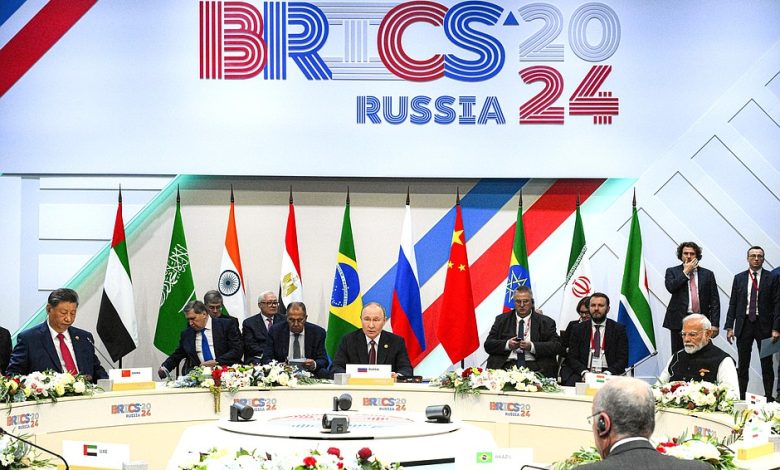Leaders of Global South Call for Building Multipolar World

-
Leaders of Global South Call for Building Multipolar World at BRICS Summit 2024
-
Putin hosts BRICS Summit in Kazan, Russia, for expanding cooperation in Global south
-
President Vladimir Putin meets Xi Jinping, Narendra Modi and Cyril Ramaphosa at BRICS Summit in Kazan, Russia.
-
Brazil’s President Lula canceled his attendance due to injury
By: Muhammad Arif, Editor NSN.Asia
Kazan : Russian President Vladimir Putin met with BRICS leaders as the 16th BRICS Summit commenced in Kazan, Russia, to forge cooperation with countries of Global South for building a multipolar world.
On the sidelines of BRICS summit in Kazan, Putin held one- on-one talks with BRICS members and discussed ways to foster bilateral trade, economic policy and the sovereign and diplomatic sharing of cultures and ideas.

Some 32 countries are participating in BRICS Summit in Kazan, Russia.
Russian President Vladimir Putin meeting with Chinese President Xi Jinping who is in Kazan city for the 16th BRICS Summit, being held to forge cooperation with countries of Global South.

Russian President Vladimir Putin meeting with President Abdel Fattah Al-Sisi on the sidelines of the summit of the BRICS countries, being held in the Russian city of Kazan.
President of Russia Vladimir Putin Meeting President of the Republic of South Africa Cyril Ramaphosa held talks on the sidelines of the 16th BRICS Summit in Kazan (October 22, 2024)
Russia’s President Vladimir Putin and Prime Minister of India Narendra Modi held a meeting on the sidelines of the BRICS Summit in Kazan (October 22, 2024)
Russia’s President Vladimir Putin Meeting with New Development Bank President Dilma Rousseff on the sidelines of the BRICS Summit in Kazan (October 22, 2024)
BRICS founder member Brazil’s President, Luiz Inácio Lula da Silva, canceled his planned trip to Russia for the Brics summit following a fall at his home that resulted in a minor brain hemorrhage. Lula, who is 78 years old, participated in the summit via videoconference.
Russian President Vladimir Putin held talks with Turkish President Recep Tayyip Erdogan “on the fields” of the 16th BRICS summit (Kazan, October 23, 2024).
Russia’s President Vladimir Putin and President of Venezuela Nicolas Maduro met on the sidelines of the BRICS Summit.
Russian President Vladimir Putin meeting with Indian PM Modi on the sidelines of the summit of the BRICS countries being held in the Russian city of Kazan.
The BRICS countries (Brazil, Russia, India, China, and South Africa) are powerful economies with great potential and capacity for growth, said Dilma Rousseff, president of the New Development Bank (#NDB). “Measured by GDP, the BRICS countries have already surpassed the G7 in importance,” said the former Brazilian president.

BRICS are five major emerging markets with considerable economic potential. Other than the countries that became new full members on Jan. 1, 2024, over 30 countries like Thailand, Malaysia, Türkiye and Azerbaijan have either formally applied for or expressed interest in its membership, while many other developing countries are seeking deeper cooperation with the group.
The BRICS countries have realized that it is very important for emerging and developing countries to have proper mechanisms and instruments, thus the NDB and the Contingent Reserve Arrangement were established, Rousseff said.
The NDB is designed to guarantee much-needed investments in infrastructure, such as in logistics and digital areas, in social infrastructure, like school and university structures, as well as in science, technology and innovation, and also in health, she said.
These emerging economies under the BRICS have been the driving force behind the establishment of an alternate world order, independent of the west, America and Britain in particular.
BRICS has expanded to now include Egypt, Ethiopia, Iran and the United Arab Emirates, with Iran mulling over whether to join the bloc.

The BRICS countries and all others who have been invited to attend the summit, and have, have no regard whatsoever for selective western sanctions on Russia nor western international arrest warrants for President Vladimir Putin, proving how irrelevant the west is to their enterprise.
Currently, with the inclusion of new member countries, now called BRICS+, they represent more than 45 percent of the world’s population (3.6 billion), more than 40 percent of all oil production and about a quarter of the world’s exports of goods.
BRICS+ represents the future of an international economic system that primarily reflects the interests of the developing economies of the Global South.
BRICS expansion expected in Russia through new category of “partner nations.“
The expanding list shows the unique appeal of BRICS for countries across different continents, especially among the Global South countries, and their enthusiasm has been ignited by development opportunities the BRICS can bring as well as the platform’s inclusive and open nature.
The BRICS summit in Kazan is themed ‘Strengthening Multilateralism for Just Global Development and Security’.
The BRICS are moving quickly towards building a more inclusive international order, bringing to the fore the desire of the countries of the Global South to build an international order that is truly democratic, inclusive, and multilateral.
Some 32 countries have confirmed their participation in the meeting, scheduled to be held from Oct 22 to 24. Of them, 24 states will be represented by their heads and eight by their senior officials, said Russian presidential aide Yury Ushakov.
Russian President Vladimir Putin, during a meeting with representatives of mainstream media outlets from BRICS countries, in Moscow, highlighted the influence of the BRICS cooperation mechanism, noting that the group has expanded to 10 member countries, with 30 more nations expressing interest in collaborating with BRICS or seeking various forms of participation.
He underscored that the formation of BRICS has never been aimed at other countries, but rather is based on shared values, development perspectives and the principle of mutual benefit.

